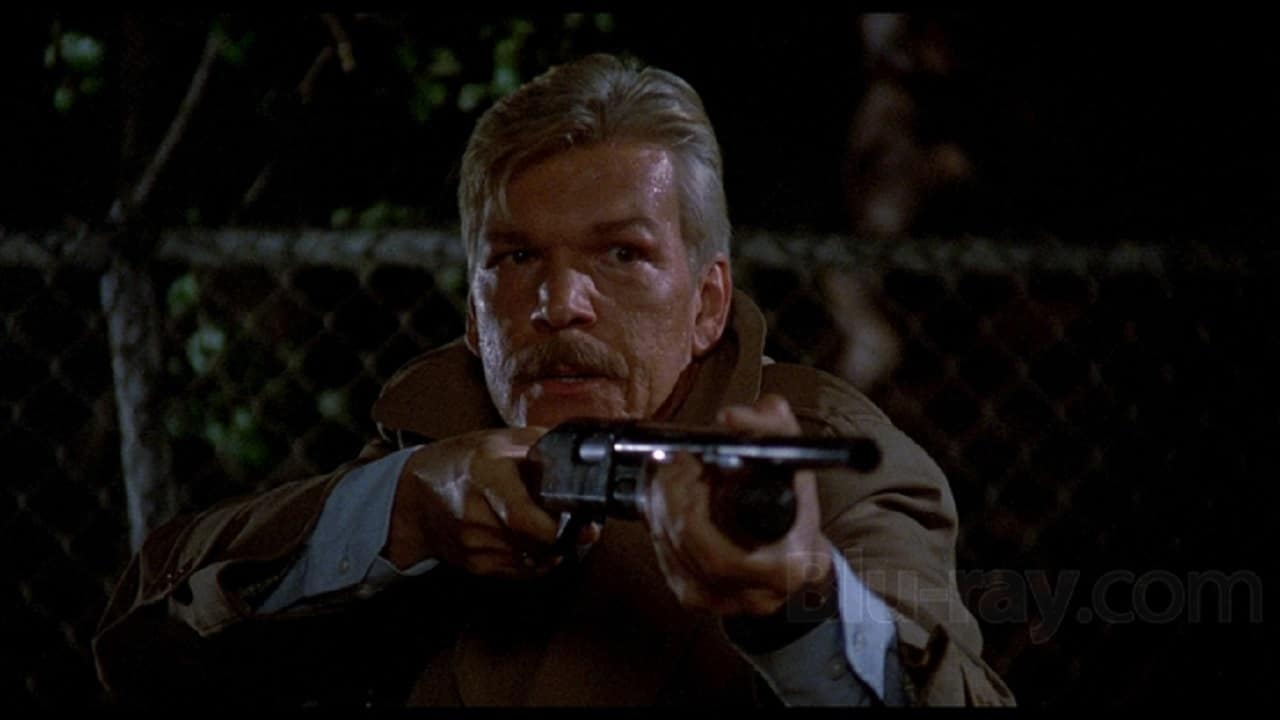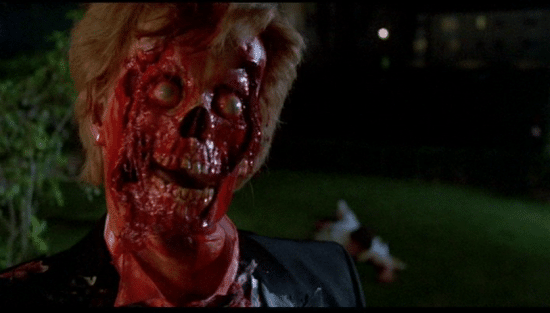 by Ben Bussey
by Ben Bussey
READER ADVISORY: spoilers ahead (though perhaps that’s a given on a retrospective…)
22nd August 1986; a day that will live in… well, I can’t honestly say I have any conscious memory of that particular day. I was six years old and living in North-East England. As such, I certainly wasn’t aware that it was the day on which Night of the Creeps was unleashed into US cinemas. It’s fair to assume a great many Americans were also unaware of this, given how poorly it performed at the box office. But now, a full twenty-five years on, it’s a film well worth rediscovering. It might not be what anyone would class as a masterpiece, but nonetheless it’s a thoroughly endearing, rewatchable, quotable, oddball genre mish-mash that oozes film geek chic. It’s inescapably 80s, but at once timeless, and yet somehow ahead of its time too in some respects. Not bad for the directorial debut of a filmmaker who more or less sprang up from nowhere and would, alas, soon enough disappear back there.
To throw a little light on my personal relationship with this film, I must first confess that I only saw it for the first time about three or four years ago. Even after spending a fair percentage of my formative years browsing the lower shelves of my local video rental stores, I was never aware of it growing up, and it has yet to recieve a Region 2 DVD release. But when I got the chance to see it that day three or four years ago, I couldn’t miss it for one simple reason: Fred Dekker, the writer-director responsible for what remains my absolute favourite film of all time. No, funnily enough I don’t mean Robocop 3. So given that Dekker has to date directed only three feature films, that means, yes, I’m talking about The Monster Squad. I’ve made no secret of just how much that film means to me, and perhaps I will elaborate further if/when I do a 25th anniversary retrospective on The Monster Squad around about this time next year. But for now let’s keep the focus on my first encounter with Night of the Creeps; seeing through adult eyes the first film of a director whose second film left an indelible impact on my childhood.
I won’t lie, the main thought that kept echoing in my mind throughout the first half hour or so was, “What the hell am I watching?”
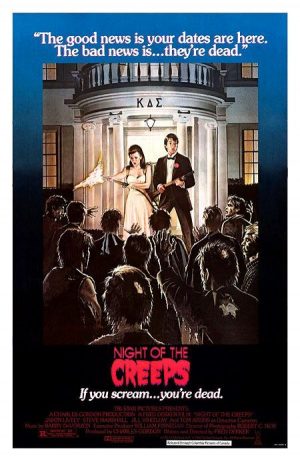 Now, obviously I don’t mean that I thought it was bad; I’m not such a masochist as to sit down to write a retrospective on a film I’m not a fan of. What I mean is I literally couldn’t figure the damn film out at first. Very little is given away by the initial title sequence, which appropriately enough simply highlights the title, in a font agreeably reminiscent of EC Comics (Dekker has likened the logo to that of Famous Monsters of Filmland). Next thing you know we’re on a spaceship, watching an amusingly dome-headed alien rushing down a corridor clutching a canister. Right, so we’re watching a sci-fi movie then. But wait… now it’s suddenly gone black and white and we’re on Sorority Row in 1959. Long-skirted, cardigan-wearing college girls beam into telephones about dreamy guys, the radio hums with the sound of crooning, and a girl goes for a drive in her boyfriend’s convertible. Okay, so it’s an homage to 50s teen movies instead. But then a comet comes down to earth, It Came From Outer Space style; ah, so we’re back to sci-fi. But hang on; now there’s an axe-wielding escaped mental patient in the mix. So what, it’s a slasher too now? And he’s raising his axe to strike, when all of a sudden we cut to the same Sorority Row in 1986, everything’s Technicolor again, some distinctly 80s soft rock fills the air, and we overhear a couple of nerdy young men ruminating on heartbreak. So where are we now, John Hughesville?
Now, obviously I don’t mean that I thought it was bad; I’m not such a masochist as to sit down to write a retrospective on a film I’m not a fan of. What I mean is I literally couldn’t figure the damn film out at first. Very little is given away by the initial title sequence, which appropriately enough simply highlights the title, in a font agreeably reminiscent of EC Comics (Dekker has likened the logo to that of Famous Monsters of Filmland). Next thing you know we’re on a spaceship, watching an amusingly dome-headed alien rushing down a corridor clutching a canister. Right, so we’re watching a sci-fi movie then. But wait… now it’s suddenly gone black and white and we’re on Sorority Row in 1959. Long-skirted, cardigan-wearing college girls beam into telephones about dreamy guys, the radio hums with the sound of crooning, and a girl goes for a drive in her boyfriend’s convertible. Okay, so it’s an homage to 50s teen movies instead. But then a comet comes down to earth, It Came From Outer Space style; ah, so we’re back to sci-fi. But hang on; now there’s an axe-wielding escaped mental patient in the mix. So what, it’s a slasher too now? And he’s raising his axe to strike, when all of a sudden we cut to the same Sorority Row in 1986, everything’s Technicolor again, some distinctly 80s soft rock fills the air, and we overhear a couple of nerdy young men ruminating on heartbreak. So where are we now, John Hughesville?
While we’re nit-picking, we might also note that Night of the Creeps is hardly the most appropriate title, given that – even if we discount the 1959 prologue – the action takes place over the course of several days. Hmm… Long Weekend of the Creeps, perhaps…?
And we’re not even half done. We haven’t got to the cryogenically frozen body, or the Cronenbergian parasitic slug-type things that turn people into zombies, or the necessity of both shotguns and flamethrowers, or the old school cop who saves the day and steals the movie. Yes, there’s quite a lot going on here. One almost wants to credit Dekker with some clairvoyance as to how regrettably short-lived his career would turn out to be, as Night of the Creeps feels like the work of someone who wants to squeeze pretty much all the stuff he likes into a single movie for fear that he might never get another chance. All this considered you’d be forgiven for assuming the results would be a god-awful mess, but no. Far from reeking of contrivance and desperation, as it might have in less capable hands, Night of the Creeps instead radiates pure enthusiasm for film, and – much as is true of The Monster Squad – this spirit proves highly infectious. Why, you could almost say it’s as if it gets into your brain and takes hold of you.
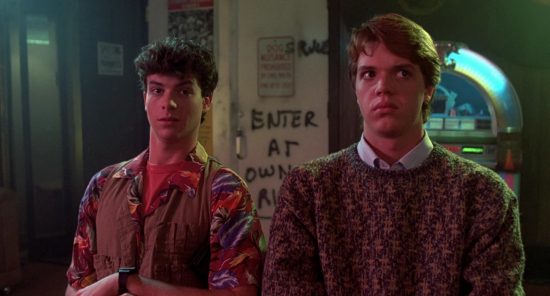 And the great thing is, in spite of the convoluted plot in which it is eventually explained that brain-eating alien organisms are zombifying much of the college campus, what really draws you in and hooks you is the cast. Dekker may have overloaded everything conceptually, but he clearly understands that the key to really drawing the audience in is protagonists they can care about and relate to. Henceforth, we have Jason Lively’s Chris, and Steve Marshall’s JC. Both young actors (Lively was only 18), and neither exactly boasting teen idol good looks, they’re the loser underdogs that so many of us feel we are. But what they lack in alpha male virility they more than make up in wit, Chris ever ready with some pithy self-deprecation and JC constantly spouting overconfident wisecracks. They could easily pass as a prototype for all the best buddy relationships that later became the staple of Kevin Smith, except Smith never threw his characters into quite so freakish a scenario as Dekker does here. (Well, aside from Dogma.)
And the great thing is, in spite of the convoluted plot in which it is eventually explained that brain-eating alien organisms are zombifying much of the college campus, what really draws you in and hooks you is the cast. Dekker may have overloaded everything conceptually, but he clearly understands that the key to really drawing the audience in is protagonists they can care about and relate to. Henceforth, we have Jason Lively’s Chris, and Steve Marshall’s JC. Both young actors (Lively was only 18), and neither exactly boasting teen idol good looks, they’re the loser underdogs that so many of us feel we are. But what they lack in alpha male virility they more than make up in wit, Chris ever ready with some pithy self-deprecation and JC constantly spouting overconfident wisecracks. They could easily pass as a prototype for all the best buddy relationships that later became the staple of Kevin Smith, except Smith never threw his characters into quite so freakish a scenario as Dekker does here. (Well, aside from Dogma.)
Then we have the girl who steals the heart of our young hero: Jill Whitlow as Cynthia. This would seem a good place to acknowledge that, while Night of the Creeps by no means excludes the girls in the audience, it’s ultimately more for the boys. The character of Cynthia highlights this as, frankly, she’s pure male wish-fulfillment; an utterly romanticised, idealised icon of femininity. Chris sees her from at least fifty yards away and it’s love at first sight. This first impression is soon validated; while she may at first be dating the alpha frat boy scumbag, she proves to be sensitive and pure of heart, taking Chris and JC’s side, and coming to them in her hour of need. Chris’s victory is ultimately sealed by the fact that he gets the girl in the end. Does any of this ring true to reality, or present an especially progressive stance on gender relations? Not really. But then, this isn’t exactly a realistic film. If we can overlook such concerns and accept the character as is, Whitlow does a wonderful job. And despite the fact that she briefly appears topless (which rather breaks those ‘final girl’ rules), there’s a refreshing lack of voyeurism by comparison with the way female love interests are typically presented today. Dekker’s camera doesn’t leer the way, say, Michael Bay’s does; it’s more of a longing, puppy-dog gaze. The nude scene notwithstanding, Dekker is less interested in scrutinizing Whitlow’s anatomy than he is in striving to show her heart. This serves to emphasise that Chris’s feelings are not limited to lust; he doesn’t just want to get laid, he wants to make a real, personal connection with this girl. Twilight fans would probably approve. That said, let’s not forget that Cynthia also gets to kick all kinds of zombie ass by the end, so she ain’t all sweetness and light. Which, of course, boosts her fanboy object of desire status even further. (You never see Bella bust out a flamethrower, do you?)
But if John Hughes adolescents don’t quite grab you, how about a hard-drinking, hard-boiled detective in a vintage car and a trenchcoat, who’s got a score to settle with all things undead? Enter Tom Atkins as Ray Cameron, seemingly walking right off the pages of a pulp novel into this pop culture collage of a movie. If you’re ever to hear someone casually quoting Night of the Creeps, a hundred to one says they’re quoting Atkins. The knowledgable and observant will already have noted that I did it myself in the title of this article; “thrill me,” the signature one-liner with which he makes his presence known. Nor is that his only memorable line: “It’s Miller time!” “Detective Cameron? – No, Bullwinkle Moose!” Then there’s the one they put on the poster: “Well girls, I got some good news and some bad news…” Music to a film geek’s ears. If Lively, Marshall and Whitlow give the film its heart, Atkins really gives it some balls. Though he certainly does give it some heart too, which we’ll come back to later.
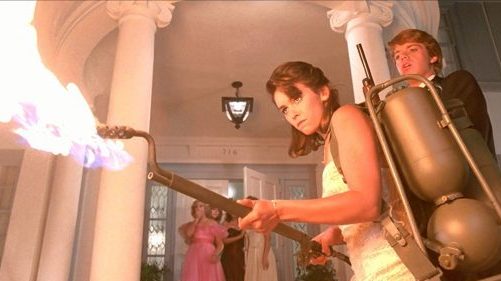 The point I keep returning to here is what a real film geek movie Night of the Creeps is. This much is evident immediately from the disorienting genre-hopping of the first few scenes, and it really gets hammered home as we catch the names of our principal characters: Chris Romero, JC Hooper (the initials standing for John Carpenter), Cynthia Cronenberg, Ray Cameron; there are even cops named Landis and Raimi, and a janitor named Mr Miner. (Okay, so we don’t generally hold Steve Miner in such high regard nowadays, but he did give Dekker his first Hollywood job as a writer by filming House, and also did some uncredited second unit work here, shooting the dressing up montage prior to the sorority house finale.) Then of course there’s the sure-fire signifier of any cult movie, the Dick Miller cameo. This abundance of references to genre cinema both old and (at the time) new gives the movie a knowing edge that was arguably not too common in the 80s. This was six years before Reservoir Dogs and a decade before Scream; intertextual referencing was not yet hip and groovy. Is it fair to call the movie a trailblazer in this regard? Given that it wasn’t a hit on release, and that I only saw it myself for the first time three or four years ago, I couldn’t really say with any authority. But I certainly get the feeling it might have been.
The point I keep returning to here is what a real film geek movie Night of the Creeps is. This much is evident immediately from the disorienting genre-hopping of the first few scenes, and it really gets hammered home as we catch the names of our principal characters: Chris Romero, JC Hooper (the initials standing for John Carpenter), Cynthia Cronenberg, Ray Cameron; there are even cops named Landis and Raimi, and a janitor named Mr Miner. (Okay, so we don’t generally hold Steve Miner in such high regard nowadays, but he did give Dekker his first Hollywood job as a writer by filming House, and also did some uncredited second unit work here, shooting the dressing up montage prior to the sorority house finale.) Then of course there’s the sure-fire signifier of any cult movie, the Dick Miller cameo. This abundance of references to genre cinema both old and (at the time) new gives the movie a knowing edge that was arguably not too common in the 80s. This was six years before Reservoir Dogs and a decade before Scream; intertextual referencing was not yet hip and groovy. Is it fair to call the movie a trailblazer in this regard? Given that it wasn’t a hit on release, and that I only saw it myself for the first time three or four years ago, I couldn’t really say with any authority. But I certainly get the feeling it might have been.
Here was the part where I had hoped to heap particular praise on Dekker for his subtle homage to Plan 9 From Outer Space, in showing Ray Cameron stop to sniff the roses; the same roses which are framed against the backdrop of the burning sorority house in the final moments. My intent had been to highlight not only how Dekker referenced Plan 9 before it was trendy to do so (Burton’s Ed Wood didn’t show up for another eight years), but also how he didn’t make a cheap gag out of it; how he implicitly relates the tragic figure of Bela Lugosi to that of Ray Cameron, a man left similarly broken by loss, pain and regret. However, on the DVD commentary Dekker insists that he was not consciously referencing Plan 9 (even though footage from the film itself is present, on the house mother’s TV), and that the sniff of the roses was entirely Tom Atkins’ idea. So bang goes that theory.
Still, one movie that is most definitely referenced more than once here is Jaws. Dekker has long since declared Spielberg’s breakthrough classic to be his favourite movie, and he borrows a few of the film’s most famous shots to good effect. Note Ray Cameron’s early dream sequence, in which edits are hidden by beach-strolling bodies passing the camera, and later the iconic ‘warp zoom’ utilised when Cameron comes face to face with the re-animated axe murderer. It’s notable that all these fancy, heroic shots tend to feature Tom Atkins; see also the rotating dolly shot in which Cameron spins around roaring, taking out three zombies in a row. If we want to get a bit psychoanalytical, we could certainly say that Dekker seems to be living out his fanboy fantasies through this old tough guy character; we get the impression that Chris and JC reflect the kind of person he really is (or, at least, was at the time), whilst Ray Cameron is the kind of guy he fantasises about being. A great many men in the audience feel much the same, I think it’s safe to say.
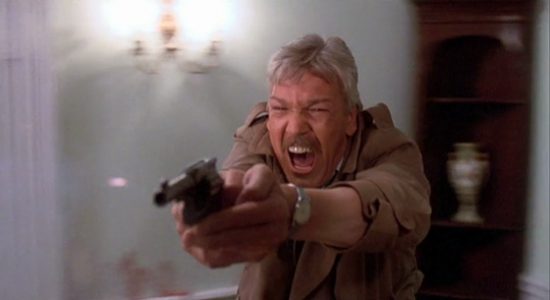 And can you believe I’ve spent this long talking about a sci-fi horror comedy and haven’t even touched on the monsters yet? It’s as though, in Dekker’s world, the parasites of Cronenberg’s Shivers gave birth not to liberated sex fiends but the classic zombies of Night of the Living Dead. They don’t set out to redesign the wheel here, delivering simple, pale skinned, white-eyed shuffling corpses, but the real ace up the sleeve is the unique method of dispatch. It really feels like the culmination of a pub debate: “What’s cooler, blowing their brains out or burning them alive?” “Hey, I know – what if we blow their brains out, AND burn them alive?” “AWESOME!” And it really is. What a fun-filled final reel it gives us, with Chris, Cynthia and Cameron wasting creeps every which way. We also can’t fail to notice a pre-Braindead (or, for y’all Americans, Dead Alive) use of a lawnmower. It’s certainly not the goriest climax the 80s gave us, but it sure is some good, brain-blasting entertainment.
And can you believe I’ve spent this long talking about a sci-fi horror comedy and haven’t even touched on the monsters yet? It’s as though, in Dekker’s world, the parasites of Cronenberg’s Shivers gave birth not to liberated sex fiends but the classic zombies of Night of the Living Dead. They don’t set out to redesign the wheel here, delivering simple, pale skinned, white-eyed shuffling corpses, but the real ace up the sleeve is the unique method of dispatch. It really feels like the culmination of a pub debate: “What’s cooler, blowing their brains out or burning them alive?” “Hey, I know – what if we blow their brains out, AND burn them alive?” “AWESOME!” And it really is. What a fun-filled final reel it gives us, with Chris, Cynthia and Cameron wasting creeps every which way. We also can’t fail to notice a pre-Braindead (or, for y’all Americans, Dead Alive) use of a lawnmower. It’s certainly not the goriest climax the 80s gave us, but it sure is some good, brain-blasting entertainment.
But before we pack away Night of the Creeps and pop it on the shelf marked ‘pure escapist fantasy,’ we would do well to acknowledge its harsher, bolder elements. First off, let’s address JC’s disability. It’s rare indeed for one of the leads in a film to be disabled without it ever being made an issue of, but that’s very much the case here. Steve Marshall mentions on the DVD that Dekker never discussed it with him, but he has since come to understand that JC’s impairment feeds his hardened, wisecracking nature; in the few times his crutches are directly drawn attention to it’s JC making a joke out of it, saying “funny as a crutch,” or miming a machine gun with them. Does this make it any more tragic when JC is killed? It goes without saying that an able-bodied person stands a better chance of escaping the deadly situation JC finds himself trapped in, and the fact that the film is willing to kill its most vulnerable character is a powerful statement of intent, lending an unexpectedly hard edge to what is for the most part a fairly light-hearted affair.
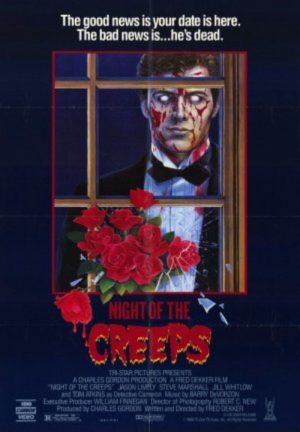 Nor does the hard edge stop there. I’ve already alluded to the tragic, tortured side of Ray Cameron; this goes beyond the melancholic and into the suicidal. Having almost thirty years earlier lost the woman he loved to an axe murdering maniac that same night a botched biological experiment from outer space fell to earth (boy, don’t shrinks get tired of hearing that one), Cameron has never come to terms with his grief, and would most likely have drunk himself to death already were it not for the job. Such characters were popular in 80s Hollywood, Rambo and Riggs being other notable examples of traumatised, suicidal men unable to adapt to normal life, whose only release comes through violence. The key difference, however, is that while those action men found redemption and a new sense of purpose, Cameron gets his wish and is allowed to kill himself. Yes, he destroys the alien parasite menace in doing so, but does that perhaps only serve to validate that which he was intent on doing regardless? Let’s not forget that before Chris shows up to seek his help on that fateful night, he was all set to blow up his own house, and himself with it. When he gets to do it in the sorority house instead, it’s a double-barrelled cathartic impact; the creeps are defeated and Cameron’s out of his misery, and it would appear we’re invited to take comfort in both. Does this make Night of the Creeps a pro-suicide/assisted death horror movie? Is there a moralist protest in waiting here…?
Nor does the hard edge stop there. I’ve already alluded to the tragic, tortured side of Ray Cameron; this goes beyond the melancholic and into the suicidal. Having almost thirty years earlier lost the woman he loved to an axe murdering maniac that same night a botched biological experiment from outer space fell to earth (boy, don’t shrinks get tired of hearing that one), Cameron has never come to terms with his grief, and would most likely have drunk himself to death already were it not for the job. Such characters were popular in 80s Hollywood, Rambo and Riggs being other notable examples of traumatised, suicidal men unable to adapt to normal life, whose only release comes through violence. The key difference, however, is that while those action men found redemption and a new sense of purpose, Cameron gets his wish and is allowed to kill himself. Yes, he destroys the alien parasite menace in doing so, but does that perhaps only serve to validate that which he was intent on doing regardless? Let’s not forget that before Chris shows up to seek his help on that fateful night, he was all set to blow up his own house, and himself with it. When he gets to do it in the sorority house instead, it’s a double-barrelled cathartic impact; the creeps are defeated and Cameron’s out of his misery, and it would appear we’re invited to take comfort in both. Does this make Night of the Creeps a pro-suicide/assisted death horror movie? Is there a moralist protest in waiting here…?
Some of you are almost certainly accusing me of overthinking the movie now; you feel the correct response to Night of the Creeps is just to embrace the absurdity, and enjoy it. And neither of us is wrong. That’s the real beauty of a good genre film: whether you want to intellectualise or just kick back, it gives you scope to do both. This is definitely the case with Night of the Creeps. This is a big part of what makes it such an easy film to revisit, and take new pleasures from with every viewing; even though I first saw it only three or four years ago, I’ve certainly made up for lost time since. Most of all, Night of the Creeps stands proud alongside The Monster Squad as – box office be damned – a twin triumph for Fred Dekker. (Let’s just agree not to talk about Robocop 3.) As Dekker himself has remarked, perhaps it’s better to have done a couple of films that mean a hell of a lot to a comparatively small audience, than to have made a whole bunch of films that no one really cares about. Given how the output of so many of the genre greats tends to go downhill with time and age – take Dekker’s acknowledged heroes Romero, Carpenter and Hooper – maybe we should be glad that Dekker, in an indirect kind of way, quit while he was ahead. (Hey – we agreed not to mention the R word…) He may have aspired to Spiebergian status, and there’s not a doubt in my mind that with a different roll of the dice he could have got there, but instead Fred Dekker has had to make do with being responsible for two bona fide cult classics. I should hope that’s good enough for all of us.
So here’s to 25 years of Night of the Creeps. You sure have thrilled me. Oh, and look at that, I managed to get through this whole thing without saying a single derogatory word about Slither…
